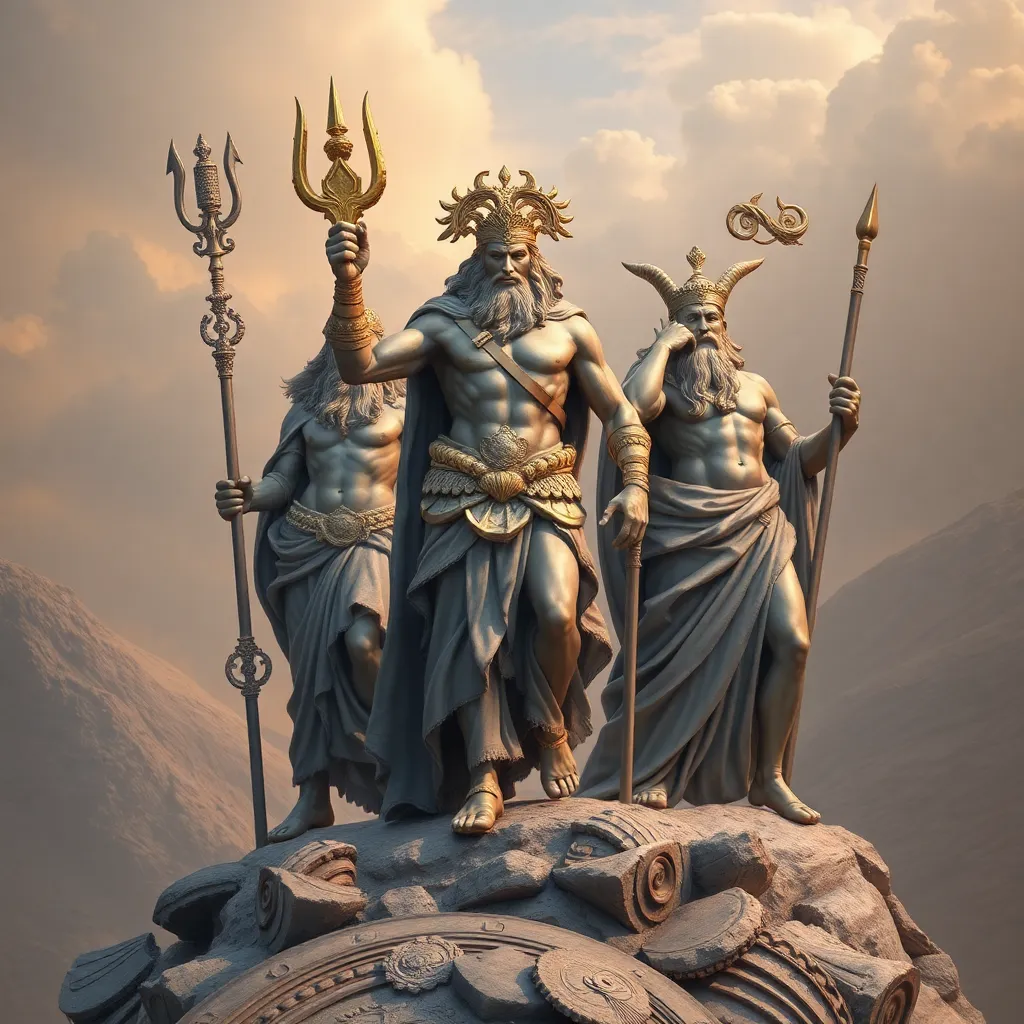The Relationship Between Ares and Other Greek Gods
I. Introduction
Ares, the Greek god of war, is a complex figure within Greek mythology. Often depicted as a fierce and aggressive deity, Ares embodies the chaotic and violent aspects of conflict. Understanding Ares’ relationships with other deities is crucial for grasping the dynamics of the Olympian pantheon and the broader themes within Greek mythology.
This article aims to explore Ares’ interactions with significant gods and goddesses, including his father Zeus, his rival Athena, his lover Aphrodite, and others. Through these relationships, we can gain insight into Ares’ character, significance, and the impact he had on myths and culture.
II. Ares and Zeus: The Father-Son Dynamic
Ares is the son of Zeus, the king of the gods. This relationship is marked by tension and conflict, as Ares often finds himself at odds with his father’s ideals.
- Ares’ role as Zeus’ son: As the offspring of Zeus and Hera, Ares holds a significant position in the hierarchy of the gods. However, he often falls short of the expectations set by his father.
- Tensions and conflicts between Ares and Zeus: Zeus, who represents order and justice, frequently disapproves of Ares’ brutal nature. Their relationship is characterized by Zeus’ attempts to rein in Ares’ chaotic tendencies.
- Zeus’ influence on Ares’ reputation and actions: Despite being a god, Ares struggles with his reputation, often seen as less honorable than other deities, particularly due to Zeus’ disapproval.
III. Ares and Hera: The Complex Relationship
Hera, Ares’ mother and the goddess of marriage, has a complicated relationship with her son.
- Hera’s disdain for Ares: Hera often views Ares with disdain, perceiving his violent nature as a threat to her ideals of harmony and order.
- The implications of Ares’ warlike nature on Hera’s values: Ares’ love for chaos and conflict directly contradicts Hera’s emphasis on stability and familial loyalty.
- Instances of conflict and cooperation: Although their relationship is fraught with tension, there are moments where Hera supports Ares, especially when his actions align with her interests.
IV. Ares and Athena: War and Wisdom
Ares and Athena represent two opposing aspects of warfare: chaos versus strategy.
- Contrasting roles: Ares embodies the chaotic, brutal side of war, while Athena represents wisdom, strategy, and discipline in battle.
- Historical anecdotes of their rivalry: Their differences often lead to conflict, highlighting the dichotomy of their approaches to warfare.
- The significance of their differing philosophies about war: This rivalry not only illustrates their characters but also reflects the broader themes of Greek culture, where wisdom is often valued over brute force.
V. Ares and Aphrodite: Love and Conflict
The relationship between Ares and Aphrodite is one of the most famous love stories in Greek mythology.
- The romantic relationship between Ares and Aphrodite: Their love affair is passionate yet tumultuous, signifying the conflict between love and war.
- How their love story impacts Ares’ warrior persona: Ares often finds himself torn between his duties as a god of war and his affection for Aphrodite, adding depth to his character.
- The tension between love and war in Greek mythology: Their relationship serves as a metaphor for the struggles between opposing forces, illustrating that love can exist even in the chaos of conflict.
VI. Ares and Hermes: The Messenger and the God of War
Hermes, the clever trickster and messenger of the gods, provides an interesting contrast to Ares.
- The contrasting roles of Hermes as the clever trickster: Hermes embodies cunning and communication, offering a different approach to conflict than Ares’ brute force.
- Interactions between Ares and Hermes during battles: Hermes often serves as a mediator or messenger in conflicts, highlighting the importance of communication in warfare.
- The dynamics of communication in times of war: The relationship between Ares and Hermes underscores the need for strategy and negotiation even in the face of violence.
VII. Ares’ Relationships with Minor Gods and Heroes
Ares’ interactions extend beyond the major Olympian deities to include lesser-known gods and heroes.
- Ares’ interactions with lesser-known deities: Ares associates with various minor gods associated with war and violence, such as Enyo, the goddess of war, and Phobos, the personification of fear.
- The influence of Ares on heroes like Heracles and Achilles: Ares plays a role in the exploits of heroes, often embodying the darker aspects of heroism.
- Ares’ role in various myths involving minor gods: His presence in myths often signifies the inevitable nature of conflict and the darker side of human nature.
VIII. Conclusion
In summary, Ares’ relationships with other Greek gods reveal much about his character and the themes present in Greek mythology. From his turbulent relationship with Zeus to his romantic involvement with Aphrodite, these connections illustrate the complexity of Ares as a deity.
Understanding Ares’ interactions with other gods not only enriches our grasp of his character but also enhances our appreciation of Greek mythology as a whole. The legacy of Ares lives on in contemporary culture, reminding us of the eternal struggle between love and conflict, wisdom and chaos, and the enduring nature of war.




